英语口语课前发言presentation德国German外国文化
- 格式:ppt
- 大小:4.23 MB
- 文档页数:18

英语口语课三分钟演讲稿ladies and gentleen , gd afternn! i? ver glad t stand here and give u a shrt speeh tda tpi is uth i hpe u ill lie it , and fund the iprtane in ur uth s that re herish itfirst i ant t as u se questins:1、 d u n hat is uth?2、h d u aster ur uth?uthuth is nt a tie f life, it is a state f ind it is nt rs hees , red lips and supple nees, it is a atter f the etins : it is the freshness it is the freshness f the deep springs f lifeuth eans a teperaental predinane f urage ver tiidit f the appetite , fr adventure ver the lve f ease this ften exists in a an f 60 re than a b f 20 nbd grs ld erel b a nuber f ears e gr ld b deserting ur idealsears rinle the sin , but t give up enthusias rinles the sul rr , fear , self –distrust bs the heart and turns the spirit ba t dusthether 60 f 16 , there is in ever huan being s heart the lure f nders, the unfailing hildlie appetite f hat?s next and the f the gae f living in the enter f ur heart and heart there?s a ireless statin : s lng as it reeives essages f beaut , hpe ,heer, urage and per fr en and fr the infinite, s lng as u are unghen the aerials are dn , and ur spirit is vered ith sns f niis and the ie fpessiis, then u are grn ld ,even at 20 , but as lng as ur aerials are up ,t ath aves f ptiis , there is hpe u a die ung at 80 than u!最新英语口语考试演讲稿初中英语口语演讲稿范文初二英语口语演讲稿英语口语演讲话题大学英语口语演讲稿初一英语口语演讲稿英语口语演讲稿:Help at he英语口语考试的演讲稿小学三年级英语口语演讲稿英语口语大赛演讲稿。
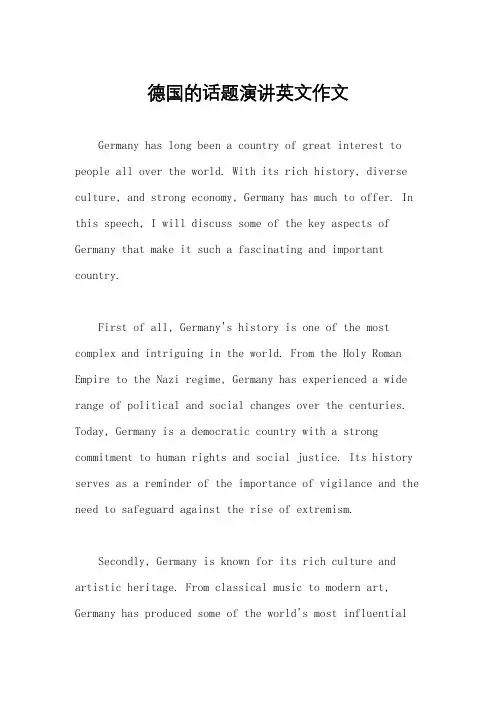
德国的话题演讲英文作文Germany has long been a country of great interest to people all over the world. With its rich history, diverse culture, and strong economy, Germany has much to offer. In this speech, I will discuss some of the key aspects of Germany that make it such a fascinating and important country.First of all, Germany's history is one of the most complex and intriguing in the world. From the Holy Roman Empire to the Nazi regime, Germany has experienced a wide range of political and social changes over the centuries. Today, Germany is a democratic country with a strong commitment to human rights and social justice. Its history serves as a reminder of the importance of vigilance and the need to safeguard against the rise of extremism.Secondly, Germany is known for its rich culture and artistic heritage. From classical music to modern art, Germany has produced some of the world's most influentialand innovative artists. The country is also home to many world-renowned museums and galleries, such as the Berlin Museum Island and the Frankfurt Museum of Modern Art. Germany's cultural offerings are a testament to its creativity and commitment to artistic expression.Thirdly, Germany is one of the world's leading economies. With a highly skilled workforce and a strong focus on innovation, Germany is a hub for technological and scientific advancement. The country is home to many of the world's largest and most successful companies, including Volkswagen, Siemens, and Bayer. Germany's economic success is a testament to its hard-working and innovative people.Finally, Germany is a country that values education and intellectual curiosity. With some of the world's top universities, such as the Technical University of Munich and the University of Heidelberg, Germany is a center for academic excellence. The country also has a strongtradition of research and development, with many groundbreaking discoveries being made in fields such as medicine and engineering.In conclusion, Germany is a country that offers much to the world. Its rich history, diverse culture, strong economy, and commitment to education and innovation make it a fascinating and important place. As we continue to navigate the challenges of the 21st century, we can look to Germany as a model of excellence and inspiration.。
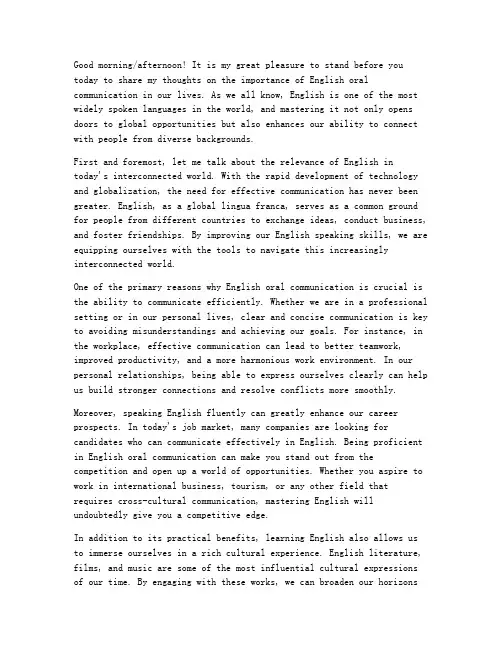
Good morning/afternoon! It is my great pleasure to stand before you today to share my thoughts on the importance of English oral communication in our lives. As we all know, English is one of the most widely spoken languages in the world, and mastering it not only opens doors to global opportunities but also enhances our ability to connect with people from diverse backgrounds.First and foremost, let me talk about the relevance of English intoday's interconnected world. With the rapid development of technology and globalization, the need for effective communication has never been greater. English, as a global lingua franca, serves as a common ground for people from different countries to exchange ideas, conduct business, and foster friendships. By improving our English speaking skills, we are equipping ourselves with the tools to navigate this increasingly interconnected world.One of the primary reasons why English oral communication is crucial is the ability to communicate efficiently. Whether we are in a professional setting or in our personal lives, clear and concise communication is key to avoiding misunderstandings and achieving our goals. For instance, in the workplace, effective communication can lead to better teamwork, improved productivity, and a more harmonious work environment. In our personal relationships, being able to express ourselves clearly can help us build stronger connections and resolve conflicts more smoothly.Moreover, speaking English fluently can greatly enhance our career prospects. In today's job market, many companies are looking for candidates who can communicate effectively in English. Being proficient in English oral communication can make you stand out from the competition and open up a world of opportunities. Whether you aspire to work in international business, tourism, or any other field that requires cross-cultural communication, mastering English will undoubtedly give you a competitive edge.In addition to its practical benefits, learning English also allows us to immerse ourselves in a rich cultural experience. English literature, films, and music are some of the most influential cultural expressions of our time. By engaging with these works, we can broaden our horizonsand gain a deeper understanding of different cultures. This not only enriches our personal lives but also fosters a sense of global citizenship.To improve our English speaking skills, it is essential to practice regularly. Here are a few suggestions:1. Engage in conversations with native speakers or language exchange partners. This will help you get accustomed to the rhythm and intonation of the language and improve your fluency.2. Watch English movies, TV shows, and YouTube videos with subtitles to enhance your listening skills and expand your vocabulary.3. Join an English speaking club or take part in public speaking competitions to build your confidence and overcome the fear of speaking in front of an audience.4. Record yourself speaking and listen back to identify areas for improvement.5. Don't be afraid to make mistakes. Mistakes are part of the learning process, and the more we make, the more we learn.In conclusion, English oral communication is an invaluable skill intoday's world. It not only helps us connect with people from different cultures but also opens up numerous opportunities in our personal and professional lives. By practicing regularly and embracing the challenges, we can all become confident and effective English speakers. Let us all strive to improve our English speaking skills and make the most of this beautiful language.Thank you for your attention, and I look forward to hearing yourthoughts and experiences on this topic. Let's continue to grow and learn together in this exciting journey of mastering English!。
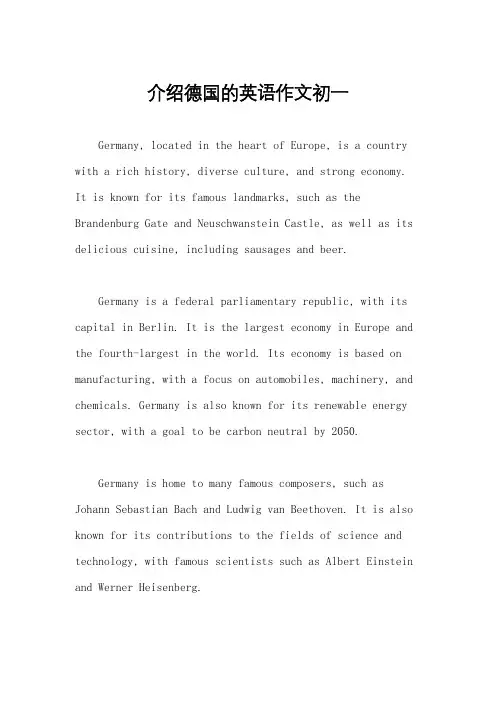
介绍德国的英语作文初一Germany, located in the heart of Europe, is a country with a rich history, diverse culture, and strong economy. It is known for its famous landmarks, such as the Brandenburg Gate and Neuschwanstein Castle, as well as its delicious cuisine, including sausages and beer.Germany is a federal parliamentary republic, with its capital in Berlin. It is the largest economy in Europe and the fourth-largest in the world. Its economy is based on manufacturing, with a focus on automobiles, machinery, and chemicals. Germany is also known for its renewable energy sector, with a goal to be carbon neutral by 2050.Germany is home to many famous composers, such as Johann Sebastian Bach and Ludwig van Beethoven. It is also known for its contributions to the fields of science and technology, with famous scientists such as Albert Einstein and Werner Heisenberg.The German education system is highly regarded, with a focus on technical and vocational education. The countryhas many prestigious universities, such as the Universityof Heidelberg and the Technical University of Munich.Germany is a popular tourist destination, with millions of visitors each year. Its cities offer a mix of modern and historical architecture, with many museums and cultural attractions. The country is also known for its beautiful natural landscapes, such as the Black Forest and the Bavarian Alps.In conclusion, Germany is a country with a rich history, strong economy, and diverse culture. It has madesignificant contributions to many fields, including science, technology, and music. Its education system is highly regarded, and it is a popular tourist destination. Germanyis truly a unique and fascinating country.。
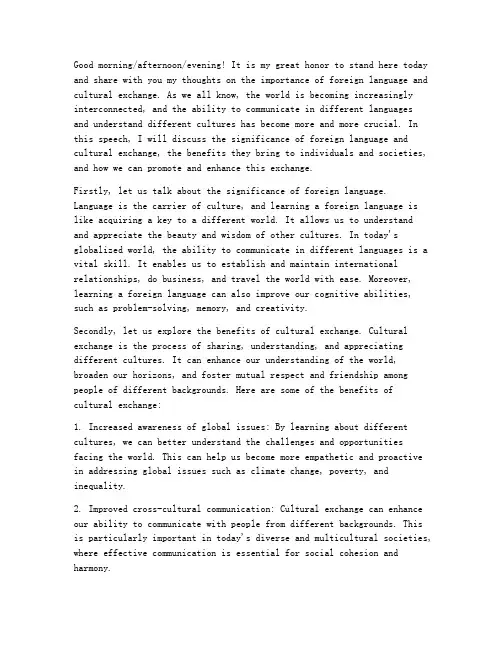
Good morning/afternoon/evening! It is my great honor to stand here today and share with you my thoughts on the importance of foreign language and cultural exchange. As we all know, the world is becoming increasingly interconnected, and the ability to communicate in different languagesand understand different cultures has become more and more crucial. In this speech, I will discuss the significance of foreign language and cultural exchange, the benefits they bring to individuals and societies, and how we can promote and enhance this exchange.Firstly, let us talk about the significance of foreign language. Language is the carrier of culture, and learning a foreign language is like acquiring a key to a different world. It allows us to understandand appreciate the beauty and wisdom of other cultures. In today's globalized world, the ability to communicate in different languages is a vital skill. It enables us to establish and maintain international relationships, do business, and travel the world with ease. Moreover, learning a foreign language can also improve our cognitive abilities, such as problem-solving, memory, and creativity.Secondly, let us explore the benefits of cultural exchange. Cultural exchange is the process of sharing, understanding, and appreciating different cultures. It can enhance our understanding of the world, broaden our horizons, and foster mutual respect and friendship among people of different backgrounds. Here are some of the benefits ofcultural exchange:1. Increased awareness of global issues: By learning about different cultures, we can better understand the challenges and opportunities facing the world. This can help us become more empathetic and proactive in addressing global issues such as climate change, poverty, and inequality.2. Improved cross-cultural communication: Cultural exchange can enhance our ability to communicate with people from different backgrounds. This is particularly important in today's diverse and multicultural societies, where effective communication is essential for social cohesion and harmony.3. Personal growth and development: Exposure to different cultures can enrich our lives and promote personal growth. It can inspire us to think differently, challenge our assumptions, and develop a more open and tolerant mindset.4. Economic benefits: Cultural exchange can boost economic growth and development. By fostering international trade and tourism, it can create jobs, generate income, and promote economic cooperation between countries.Now, let us discuss how we can promote and enhance foreign language and cultural exchange. Here are some suggestions:1. Education: The education system plays a crucial role in promoting foreign language and cultural exchange. Schools and universities should offer a wide range of language courses and encourage students to learn and practice foreign languages. Moreover, integrating cultural studies into the curriculum can help students develop a deeper understanding of different cultures.2. Government policies: Governments should support and encourage foreign language and cultural exchange through policies and programs. This can include providing funding for language education, supporting cultural events, and promoting international collaboration in education and research.3. Community initiatives: Local communities can organize cultural events, language exchange programs, and volunteer opportunities to promoteforeign language and cultural exchange. These initiatives can helppeople from different backgrounds come together and learn from each other.4. Technology: The internet and digital technology have made it easier than ever to connect with people from around the world. Online language learning platforms, social media, and video conferencing tools can facilitate foreign language and cultural exchange, breaking down geographical barriers and fostering global communication.In conclusion, foreign language and cultural exchange are of great significance in today's interconnected world. They can bring numerous benefits to individuals and societies, enhancing our understanding of the world, fostering mutual respect, and promoting global peace and prosperity. By promoting and enhancing foreign language and cultural exchange through education, government policies, community initiatives, and technology, we can create a more inclusive and harmonious world for future generations.Thank you for your attention. I welcome any questions or comments you may have.。
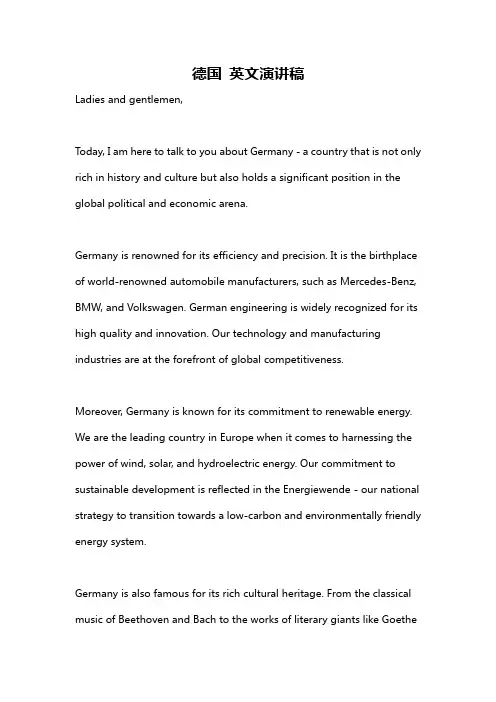
德国英文演讲稿Ladies and gentlemen,Today, I am here to talk to you about Germany - a country that is not only rich in history and culture but also holds a significant position in the global political and economic arena.Germany is renowned for its efficiency and precision. It is the birthplace of world-renowned automobile manufacturers, such as Mercedes-Benz, BMW, and Volkswagen. German engineering is widely recognized for its high quality and innovation. Our technology and manufacturing industries are at the forefront of global competitiveness.Moreover, Germany is known for its commitment to renewable energy. We are the leading country in Europe when it comes to harnessing the power of wind, solar, and hydroelectric energy. Our commitment to sustainable development is reflected in the Energiewende - our national strategy to transition towards a low-carbon and environmentally friendly energy system.Germany is also famous for its rich cultural heritage. From the classical music of Beethoven and Bach to the works of literary giants like Goetheand Schiller, our artistic contributions have left an indelible mark on the world. Berlin, our capital city, is a vibrant hub of art, music, and theater. It embraces diversity and fosters creativity, making it a global center for cultural exchange.While Germany is known for its accomplishments, we also face some challenges. Migration and integration have been topics of intense debate in recent years. However, Germany has shown its resilience by opening its doors to refugees and taking steps to facilitate their integration into our society. We believe that diversity enriches us culturally and economically, and we strive to create an inclusive and welcoming environment for all.Furthermore, Germany is committed to global cooperation andpeace-building. As a founding member of the European Union, we firmly believe in the power of multilateralism and diplomacy. We actively participate in international organizations and work closely with our global partners to address pressing global issues, such as climate change, poverty, and conflict resolution.In conclusion, Germany is a country that combines innovation, cultural heritage, and a commitment to sustainability. We are proud of ourachievements and determined to tackle the challenges that lie ahead. Join us in celebrating the accomplishments of Germany and let us continue to work together for the betterment of our shared world.Thank you.。
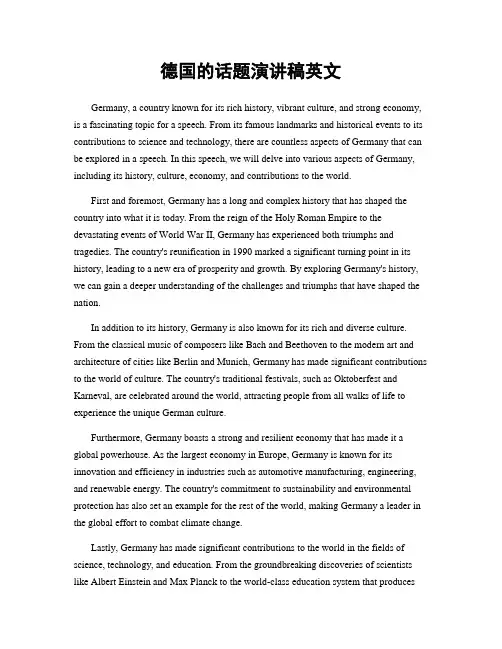
德国的话题演讲稿英文Germany, a country known for its rich history, vibrant culture, and strong economy, is a fascinating topic for a speech. From its famous landmarks and historical events to its contributions to science and technology, there are countless aspects of Germany that can be explored in a speech. In this speech, we will delve into various aspects of Germany, including its history, culture, economy, and contributions to the world.First and foremost, Germany has a long and complex history that has shaped the country into what it is today. From the reign of the Holy Roman Empire to the devastating events of World War II, Germany has experienced both triumphs and tragedies. The country's reunification in 1990 marked a significant turning point in its history, leading to a new era of prosperity and growth. By exploring Germany's history, we can gain a deeper understanding of the challenges and triumphs that have shaped the nation.In addition to its history, Germany is also known for its rich and diverse culture. From the classical music of composers like Bach and Beethoven to the modern art and architecture of cities like Berlin and Munich, Germany has made significant contributions to the world of culture. The country's traditional festivals, such as Oktoberfest and Karneval, are celebrated around the world, attracting people from all walks of life to experience the unique German culture.Furthermore, Germany boasts a strong and resilient economy that has made it a global powerhouse. As the largest economy in Europe, Germany is known for its innovation and efficiency in industries such as automotive manufacturing, engineering, and renewable energy. The country's commitment to sustainability and environmental protection has also set an example for the rest of the world, making Germany a leader in the global effort to combat climate change.Lastly, Germany has made significant contributions to the world in the fields of science, technology, and education. From the groundbreaking discoveries of scientists like Albert Einstein and Max Planck to the world-class education system that producessome of the brightest minds in the world, Germany continues to push the boundaries of knowledge and innovation. The country's commitment to research and development has led to advancements in fields such as medicine, engineering, and information technology, benefiting people around the world.In conclusion, Germany is a country with a rich history, vibrant culture, strong economy, and significant contributions to the world. By exploring the various aspects of Germany, we can gain a deeper appreciation for the nation and its people. Whether it's the historical landmarks, cultural traditions, economic achievements, or scientific advancements, Germany continues to captivate the world with its enduring legacy. Thank you.。

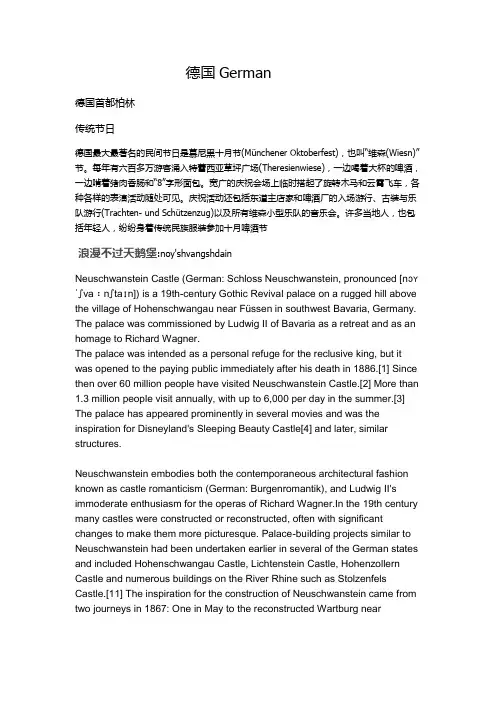
德国German德国首都柏林传统节日德国最大最著名的民间节日是慕尼黑十月节(Münchener Oktoberfest),也叫“维森(Wiesn)”节。
每年有六百多万游客涌入特蕾西亚草坪广场(Theresienwiese),一边喝着大杯的啤酒,一边啃着猪肉香肠和“8”字形面包。
宽广的庆祝会场上临时搭起了旋转木马和云霄飞车,各种各样的表演活动随处可见。
庆祝活动还包括东道主店家和啤酒厂的入场游行、古装与乐队游行(Trachten- und Schützenzug)以及所有维森小型乐队的音乐会。
许多当地人,也包括年轻人,纷纷身着传统民族服装参加十月啤酒节浪漫不过天鹅堡:noy'shvangshdainNeuschwanstein Castle (German: Schloss Neuschwanstein, pronounced [nɔʏˈʃvaːnʃtaɪn]) is a 19th-century Gothic Revival palace on a rugged hill above the village of Hohenschwangau near Füssen in southwest Bavaria, Germany. The palace was commissioned by Ludwig II of Bavaria as a retreat and as an homage to Richard Wagner.The palace was intended as a personal refuge for the reclusive king, but it was opened to the paying public immediately after his death in 1886.[1] Since then over 60 million people have visited Neuschwanstein Castle.[2] More than 1.3 million people visit annually, with up to 6,000 per day in the summer.[3] The palace has appeared prominently in several movies and was the inspiration for Disneyland's Sleeping Beauty Castle[4] and later, similar structures.Neuschwanstein embodies both the contemporaneous architectural fashion known as castle romanticism (German: Burgenromantik), and Ludwig II's immoderate enthusiasm for the operas of Richard Wagner.In the 19th century many castles were constructed or reconstructed, often with significant changes to make them more picturesque. Palace-building projects similar to Neuschwanstein had been undertaken earlier in several of the German states and included Hohenschwangau Castle, Lichtenstein Castle, Hohenzollern Castle and numerous buildings on the River Rhine such as Stolzenfels Castle.[11] The inspiration for the construction of Neuschwanstein came from two journeys in 1867: One in May to the reconstructed Wartburg nearEisenach,[12] another in July to the Château de Pierrefonds, which Eugène Viollet-le-Duc was transforming from a ruined castle into a historistic palace.In 1868, the ruins of the medieval twin castles were demolished completely; the remains of the old keep were blown up.[26] The foundation stone for the Palace was laid on September 5, 1869; in 1872 its cellar was completed andin 1876, everything up to the first floor. But the Gatehouse was finished first.At the end of the year 1873 it was completed and fully furnished, allowing Ludwig to take provisional lodgings there and observe the further construction work.[25] In 1874, direction of the civil works passed from Eduard Riedel to Georg von Dollmann.[27] The topping out ceremony for the Palas was in 1880, and in 1884, the king could move into the new building. In the same year the direction of the project passed to Julius Hofmann, after Dollmann had fallen in disgrace.The palace was erected as a conventional brick construction and later encased with other types of rock. The white limestone used for the fronts came from a nearby quarry.[28] The sandstone bricks for the portals and bay windows came from Schlaitdorf in Württemberg. Marble from Untersberg near Salzburg was used for the windows, the arch ribs, the columns and the capitals. The Throne Hall was a later addition to the plans and required a steel framework.The transport of building materials was facilitated by a scaffolding a nd a steam crane that lifted the material to the construction site. Another crane was used at the construction site itself. The recently founded Dampfkessel-Revisionsverein (Steam Boiler Inspection Association) regularly inspected both boilers.Ludwig II (1886)For about two decades the construction site was the principal employer of the region.[29] In 1880, about 200 craftsmen were occupied at the site,[30] not counting suppliers and other persons indirectly involved in the construction. At times when the king insisted on particularly close deadlines and urgent changes, reportedly up to 300 workers per day were active, sometimes at night by the light of oil lamps. Statistics from the years 1879/1880 support an immense amount of building materials: 465 t (513 short tons) of Salzburg marble, 1,550 t (1,710 short tons) of sandstone, 400,000 bricks and 2,050 m3 (2,680 cu yd) of wood for the scaffolding.In 1870 a society was founded for insuring the workers, for a low monthly fee, augmented by the king. The heirs of construction casualties (30 cases are mentioned in the statistics) received a small pension.In 1884 the king could move into the (still unfinished) Palas,[31] and in 1885, he invited his mother Marie to Neuschwanstein on the occasion of her 60th birthday.[nb 5] By 1886, the external structure of the Palas (hall) was mostly finished.[31] In the same year, Ludwig had the first, wooden Marienbrücke over the Pöllat Gorge replaced by a steel construction.Despite its size, Neuschwanstein did not have space for the royal court, but contained only the king's private lodging and servants' rooms. The court buildings served decorative, rather than residential purposes:[10] The palace was intended to serve Ludwig II as a kind of inhabitable theatrical setting.[31] As a temple of friendship it was also devoted to life and work of Richard Wagner, who died in 1883 before he had set foot in the building.[32] In the end, Ludwig II only lived in the palace for a total of 172 days.部分译文:新天鹅堡(New Swan Stone Castle)是19世纪晚期的建筑,位于德国巴伐利亚西南方,邻近年代较早的高天鹅堡,距离菲森镇约4公里,离德国与奥地利边界不远。
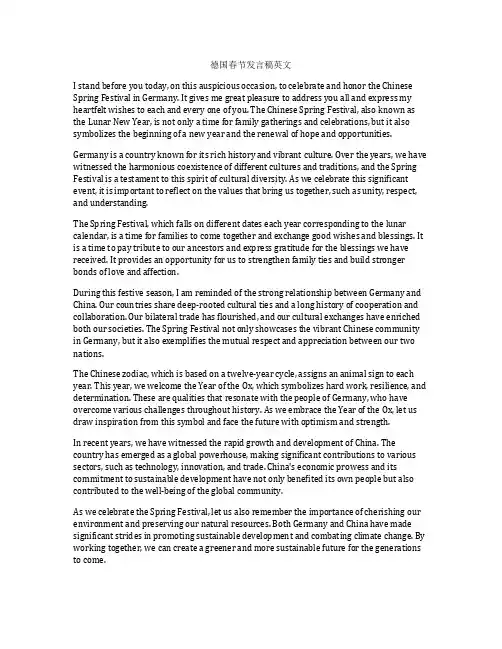
德国春节发言稿英文I stand before you today, on this auspicious occasion, to celebrate and honor the Chinese Spring Festival in Germany. It gives me great pleasure to address you all and express my heartfelt wishes to each and every one of you. The Chinese Spring Festival, also known as the Lunar New Year, is not only a time for family gatherings and celebrations, but it also symbolizes the beginning of a new year and the renewal of hope and opportunities. Germany is a country known for its rich history and vibrant culture. Over the years, we have witnessed the harmonious coexistence of different cultures and traditions, and the Spring Festival is a testament to this spirit of cultural diversity. As we celebrate this significant event, it is important to reflect on the values that bring us together, such as unity, respect, and understanding.The Spring Festival, which falls on different dates each year corresponding to the lunar calendar, is a time for families to come together and exchange good wishes and blessings. It is a time to pay tribute to our ancestors and express gratitude for the blessings we have received. It provides an opportunity for us to strengthen family ties and build stronger bonds of love and affection.During this festive season, I am reminded of the strong relationship between Germany and China. Our countries share deep-rooted cultural ties and a long history of cooperation and collaboration. Our bilateral trade has flourished, and our cultural exchanges have enriched both our societies. The Spring Festival not only showcases the vibrant Chinese community in Germany, but it also exemplifies the mutual respect and appreciation between our two nations.The Chinese zodiac, which is based on a twelve-year cycle, assigns an animal sign to each year. This year, we welcome the Year of the Ox, which symbolizes hard work, resilience, and determination. These are qualities that resonate with the people of Germany, who have overcome various challenges throughout history. As we embrace the Year of the Ox, let us draw inspiration from this symbol and face the future with optimism and strength.In recent years, we have witnessed the rapid growth and development of China. The country has emerged as a global powerhouse, making significant contributions to various sectors, such as technology, innovation, and trade. China's economic prowess and its commitment to sustainable development have not only benefited its own people but also contributed to the well-being of the global community.As we celebrate the Spring Festival, let us also remember the importance of cherishing our environment and preserving our natural resources. Both Germany and China have made significant strides in promoting sustainable development and combating climate change. By working together, we can create a greener and more sustainable future for the generations to come.In conclusion, I would like to extend my warmest wishes to all those celebrating the Spring Festival in Germany. May this festival bring joy, prosperity, and good fortune to your lives. Let us continue to foster friendship, mutual respect, and understanding between our countries.Thank you. Danke schön. 谢谢大家!。

初中介绍德国礼仪的作文英语Germany is a country rich in cultural traditions and etiquette practices that have been passed down through generations. As a student, understanding the nuances of German etiquette can be incredibly valuable, not only for navigating social situations but also for gaining a deeper appreciation for the country's customs and values. In this essay, we will explore the key aspects of German etiquette that are important for individuals to be aware of.One of the most fundamental aspects of German etiquette is the emphasis on punctuality. Germans place a high value on time management and punctuality is considered a sign of respect and professionalism. It is expected that individuals arrive on time, or even a few minutes early, for appointments, meetings, and social engagements. Tardiness is generally frowned upon and can be seen as disrespectful or inconsiderate. This attention to punctuality extends to various aspects of daily life, from business meetings to social gatherings.Another important element of German etiquette is the concept ofpersonal space and physical contact. Germans generally prefer to maintain a respectful distance from others, especially in professional settings. Handshakes are a common form of greeting, but they are typically firm and brief, without any lingering or excessive physical contact. Hugging or other forms of physical affection are generally reserved for close friends and family members. It is important to be mindful of these personal space boundaries and to avoid any actions that may be perceived as intrusive or uncomfortable.Politeness and formality are also highly valued in German etiquette. In formal settings, such as business meetings or interactions with authorities, it is customary to address individuals using their formal titles and last names. The use of formal language, such as "Sie" instead of "du," is expected, especially when addressing someone for the first time or in a professional context. Maintaining a polite and respectful tone, even in casual conversations, is also important in German culture.Another aspect of German etiquette that is worth noting is the importance of table manners. Meals in Germany are often seen as a time for social interaction and are treated with a certain level of formality. It is expected that individuals sit upright at the table, keep their elbows off the table, and avoid talking with their mouths full. Additionally, it is considered impolite to start eating before the host or the eldest person at the table has begun. Proper utensil usage,such as cutting food with the knife in the right hand and the fork in the left, is also an important aspect of German table etiquette.When it comes to gift-giving, Germans have specific customs and expectations. Gifts are typically given on special occasions, such as birthdays, holidays, or housewarming events. It is important to choose a thoughtful and appropriate gift, such as a bottle of wine, a box of chocolates, or a small, practical item. Flowers are also a common gift, but it is important to be mindful of the color and type of flowers, as certain colors or varieties may have different cultural meanings. Additionally, it is considered polite to bring a small gift when visiting someone's home for the first time.In terms of dress code, Germans generally have a more formal and conservative approach to attire. In professional settings, it is expected that individuals dress in business-appropriate clothing, such as suits, dress shirts, and ties for men, and dresses, skirts, or pantsuits for women. Casual wear, such as jeans or t-shirts, is generally reserved for more informal settings or personal time. It is important to be aware of the appropriate dress code for the specific occasion or event.Finally, it is worth noting that Germans place a high value on privacy and personal boundaries. While they may be perceived as reserved or distant by some, this is often a reflection of their cultural valuesand respect for individual privacy. It is important to be mindful of these boundaries and to avoid prying or asking overly personal questions, especially in initial interactions.In conclusion, understanding the nuances of German etiquette is essential for individuals who wish to navigate social and professional situations in Germany effectively. From punctuality and personal space to formality and gift-giving, these cultural practices reflect the values and traditions that are deeply ingrained in German society. By respecting and adhering to these etiquette guidelines, individuals can demonstrate their cultural awareness and build stronger connections with their German counterparts.。
关于德国的英语演讲稿篇一:德国历史文化风景演讲稿世界文化史演讲尊敬的老师,亲爱的同学们:大家好!我是来自,今天由我带大家走近德国,感受德国的历史与文化。
德意志联邦共和国在德语中为“Bundesrepublik Deutschland”,通称Deutschland,英语中对德国的称呼“Germany”则是来源于日耳曼人。
德意志联邦共和国是一个位于中欧的议会制共和制国家。
联邦总统为国家元首,联邦总理为政府首脑。
德国是欧盟的创始会员国之一,也为联合国、北约、八国集团、《申根公约》的成员国。
德国是欧洲大陆主要的经济与政治体之一,亦为世界第二大商品出口国和第三大商品进口国,在医学研究、技术创新和科技水平等领域在世界处于领先地位。
东邻波兰、捷克,南接奥地利、瑞士,西接荷兰、比利时、卢森堡、法国,北接丹麦,濒临北海和波罗的海,是欧洲邻国最多的国家。
面积为万平方公里。
德国国旗,是横长方形,长与宽之比为5∶3。
三色国旗在机场、宾馆、宴会和其他场合悬挂。
联邦政府机构和驻外使馆等悬挂带有黑鹰图案的国旗。
旗面自上而下依次由黑、红、黄三道条纹平行相等组成。
盾形徽章“联邦之盾”位于中央。
黑鹰象征着力量和勇气。
黑色代表勤勉与力量,红色象征国民的热情,金色则代表重视荣誉。
在文艺方面,受意大利文艺复兴的影响,德国的18世纪文学走向顶峰。
歌德、海涅、席勒、莱辛都是杰出的代表。
音乐是德国人生活中不可缺少的组成部分。
德国造就了各个不同时期的音乐大师,如贝多芬、巴赫、门德尔松、瓦格纳等。
享誉世界的柏林爱乐乐团,成立于1882年,20年代,该团演出了贝多芬、勃拉姆斯等人的作品,曾在柏林轰动一时;此后又演出了莫扎特、舒曼、肖邦、海顿等作曲家的作品,受到人们的欢迎。
卡拉扬担任常任指挥后,乐团经过他的严格训练,在世界各地演出了大量古典和近代的音乐作品,赢得了很高的国际声誉。
思想方面,就有我们熟知的马克思和恩格斯。
慕尼黑位于德国南部阿尔卑斯山北麓的伊萨尔河畔,是德国主要的经济、文化、科技和交通中心之一,也是欧洲最繁荣的城市之一。
中外文化差异英文演讲三分钟Traditional Chinese culture is beginning to capture the attention of the world. This is true even as popular culture that has traditionally been considered Western begins to spread throughout China. Kung Fu, especially, has had a great impact on the millions of people who first learned about China through it. From that, they may come to China and learn about other aspects of this culture, such as traditional operas like the Beijing and Sichuan ones. Asian nations have long known about the greatness of ancient Chinese culture. Their own cultures are a mix of native ones and those Chinese characteristics. Korea and Japan long ago adopted ideas such as Confucianism is something that continues today even as it is challenged by Pop Culture. This strength comes from the ideas given in the Four Books of Confucianism (The Great Learning, The Doctrine of the Mean, The Analects of Confucius, and The Book of Mencius). These books built upon the ideas of an even more ancient period codified in the Five Classics. From them, the West learns such things as Fengshui and other concepts that are uniquely Chinese. China has taken steps to further this spread of its culture by establishing Chinese Cultural Centers in such places as the United States and Europe.。
英语课前三四分钟演讲Ladies and gentlemen,Good morning! Today, I would like to discuss the importance of learning English in today's globalized world.English has become the international language of communication. It is spoken by more than 1.5 billion people worldwide and is the official language in over 50 countries. As a result, learning English is not just a valuable skill, but a necessity for individuals who want to succeed in today's interconnected world.Firstly, English opens up a myriad of opportunities. It is the language of business, diplomacy, and technology. It is the language used in international conferences, negotiations, and trade. By acquiring proficiency in English, individuals can expand their career prospects, enhance their chances of securing employment in multinational companies, and even pursue higher education in prestigious universities abroad.Secondly, learning English enables us to connect with people from different cultures and backgrounds. It allows us to build meaningful relationships and establish cross-cultural understanding. As we communicate with people from diverse backgrounds, we gain insights into different perspectives, broaden our horizons, and grow as individuals.Moreover, English is the language of the internet. In today's digital age, the majority of the content available online is in English. Whether it is educational resources, entertainment, or research materials, knowing English allows us to access a vast pool of information and stay updated with the latest trends and developments.Lastly, learning English promotes cognitive development. Studies have shown that bilingual individuals exhibit improved problem-solving skills, better memory retention, and enhanced multitasking abilities. By learning English, we are challenging our minds, strengthening our cognitive abilities, and improving our overall mental agility.In conclusion, learning English is not just advantageous; it is indispensable in today's globalized world. It opens up opportunities, fosters cultural understanding, allows access to a wealth of information, and promotes cognitive development. So, let us embrace the English language and strive to improve our proficiency in it.Thank you for your attention.。
英语介绍德国作文六句话English:Germany is a country in Western Europe known for its rich history, culture, and strong economy. With a population of over 83 million people, Germany is the most populous country in the European Union. The country is famous for its beer, sausages, and bread, as well as its beautiful landscapes and historic sites. German is the official language of the country, and it is one of the most widely spoken languages in the world. Germany is also known for its engineering and automotive industries, with famous brands like Mercedes-Benz, BMW, and Volkswagen originating from there. Overall, Germany is a country with a lot to offer in terms of both modernity and tradition.中文翻译:德国是位于西欧的一个国家,以其悠久的历史、文化和强大的经济而闻名。
德国有超过8300万人口,是欧盟人口最多的国家。
该国以啤酒、香肠和面包以及美丽的风景和历史遗迹而闻名。
德语是该国的官方语言,是世界上使用最广泛的语言之一。
德国还以其工程和汽车工业而闻名,著名品牌如梅赛德斯-奔驰、宝马和大众均源自于此。
五年级介绍德国的英语作文Germany is a fascinating country located in the heart of Europe. It is the seventh-largest country in Europe and has a rich history and culture that has influenced the world. Germany is known for its beautiful landscapes, delicious food, and innovative technology.One of the most striking features of Germany is its diverse geography. The country is home to a variety of landscapes, from the towering Alps in the south to the flat, coastal regions in the north. The Black Forest in southwestern Germany is a popular destination for hikers and nature lovers, with its dense forests, winding streams, and charming villages. In the east, the Bavarian Alps offer breathtaking views and opportunities for skiing and other winter sports.Germany's cities are equally diverse and captivating. Berlin, the capital and largest city, is a vibrant and dynamic metropolis that blends historic landmarks with cutting-edge architecture and a thriving arts and culture scene. Visitors can explore the iconic Brandenburg Gate, the Berlin Wall, and the Reichstag building, whichhouses the German parliament. Other notable cities include Munich, known for its annual Oktoberfest celebration and its stunning Baroque and Renaissance architecture, and Hamburg, a major port city with a lively waterfront and world-class museums.One of the most distinctive aspects of German culture is its cuisine. German food is hearty, flavorful, and deeply rooted in tradition. Staple dishes include sausages, such as the famous bratwurst, as well as dishes like schnitzel (breaded and fried pork or veal), sauerbraten (marinated beef), and spätzle (a type of egg noodle). German bakers are renowned for their delectable breads and pastries, such as pretzels, stollen (a rich, fruit-filled cake), and the iconic Black Forest cake. Of course, no discussion of German cuisine would be complete without mentioning the country's renowned beer, which is brewed to exacting standards and enjoyed throughout the world.Germany is also known for its contributions to the arts and sciences. The country has produced countless influential thinkers, writers, and artists, from the philosophical giants Immanuel Kant and Friedrich Nietzsche to the literary masters Johann Wolfgang von Goethe and Thomas Mann. In the realm of music, Germany has given the world some of the most renowned composers, including Ludwig van Beethoven, Johann Sebastian Bach, and Richard Wagner. The country's scientific and technological achievements are equally impressive, with Germans playing a leading role in fields such asphysics, engineering, and computer science.One of the most fascinating aspects of German history is its turbulent 20th century, which saw the country's rise and fall as a global power. The two world wars that ravaged Europe had a profound impact on Germany, leading to the division of the country into East and West during the Cold War era. The reunification of Germany in 1990, following the fall of the Berlin Wall, was a momentous event that marked the end of this period of upheaval and the beginning of a new era of prosperity and stability.Today, Germany is a thriving, modern country that is a global leader in a wide range of industries, from automotive manufacturing to renewable energy. It is also a cultural powerhouse, with a vibrant arts scene, world-renowned universities, and a rich tradition of innovation and creativity. Whether you're interested in history, nature, or cutting-edge technology, Germany has something to offer everyone.In conclusion, Germany is a fascinating and multifaceted country that deserves to be explored and celebrated. From its stunning natural landscapes to its rich cultural heritage, Germany is a destination that is sure to captivate and inspire. So why not plan a trip and discover all that this remarkable country has to offer?。